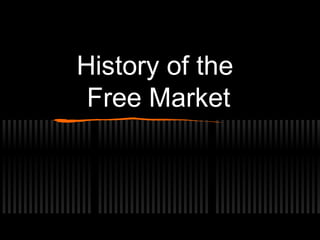Signaler
Partager

Recommandé
Recommandé
Contenu connexe
Tendances
Tendances (20)
Top ten arguments against capitalism and how one can answer them

Top ten arguments against capitalism and how one can answer them
History of Economic Thought Revisited: Beyond Left and Right

History of Economic Thought Revisited: Beyond Left and Right
En vedette
En vedette (12)
Similaire à powerpoint.12
Similaire à powerpoint.12 (18)
Document #1 History of the Economic Systems and TheoriesC

Document #1 History of the Economic Systems and TheoriesC
Accelerating the Industrial Revolution, 1800-1850More steel- s.docx

Accelerating the Industrial Revolution, 1800-1850More steel- s.docx
Group presentation on The Wealth of Nations by Adam Smith.pptx

Group presentation on The Wealth of Nations by Adam Smith.pptx
Plus de rebwball
Plus de rebwball (20)
powerpoint.12
- 1. History of the Free Market
- 2. Characteristics of the U.S. Economy: Freedom of Enterprise and Choice Producers are free to transform the factors of production into (legal) products to sell Consumers are free to purchase the products
- 3. Characteristics of the U.S. Economy: Competition Rivalry among producers/sellers of goods and services encourages products that are innovative, high in quality, low in price. encourages efficient use of resources
- 4. Characteristics of the U.S. Economy: Equal Opportunity Every citizen has the right to gain an education and to compete in the marketplace for wealth
- 5. Characteristics of the U.S. Economy Binding Contracts Agreements between people that, once entered into, must be fulfilled
- 6. Characteristics of the U.S. Economy: Property Rights Individuals and businesses own the factors of production, not the government People can also own their ideas and artistic work
- 7. Characteristics of the U.S. Economy: Profit Motive Because people have the freedom to earn a profit, they have the incentive to work hard and produce quality goods/services
- 8. Characteristics of the U.S. Economy: Limited Government Preserves competition Protects consumers, workers and the environment Stabilizes the economy
- 9. Market Economy: Flow “The reason markets work so well is because one person’s output always becomes another person’s input.” -- Ch. 3, p. 43
- 10. Adam Smith Founder of modern economic thought Wrote The Wealth of Nations in 1776
- 11. Self-Interest “It is not from the benevolence of the butcher, the brewer, or the baker, that we expect our dinner, but from their regard to their own interest. We address ourselves, not to their humanity but to their self-love, and never talk to them of our own necessities but of their advantages. Nobody but a beggar chooses to depend chiefly upon the benevolence of his fellow citizens.” -- Adam Smith, The Wealth of Nations
- 12. The force that makes this possible: the Invisible Hand of the Marketplace
- 13. The Invisible Hand: “Every individual . . . neither intends to promote the public interest, nor knows how much he is promoting it . . . He intends only his own gain, and he is in this . . . led as if by an invisible hand to promote an end which was no part of his intention. Nor is it always the worse for the society that it has no part in it. By pursuing his own interest he frequently promotes that of the society more effectually than when he really intends to promote it.” -- Adam Smith, The Wealth of Nations
- 14. How does it work? Self-interest drives producers and consumers to help one another Competition leads to more efficient production and lower prices Jobs are created, trade occurs, the economy prospers, all without government intervention
- 15. This theory led to the doctrine: Laissez-faire (“Let it Be”) Absence of government control Economic competition weeds out the weak and preserves the strong (like natural selection)
- 16. Free Market System = Capitalism The late 1800s and early 1900s was an era of rapid industrialization
- 17. Capitalism Government stayed out of business, and monopolies formed, controlling prices and production
- 18. Capitalism Millions worked long hours for low pay in dangerous factories and mines no work-safety regulations, no minimum wage laws, no child labor laws, no social security or pensions
- 22. A Response: Karl Marx Marx believed Capitalism would eventually destroy itself Those at the bottom would rebel against the owners of the factories
- 23. Final Stage: Communism A new society would rise in which all were equal and private property would disappear